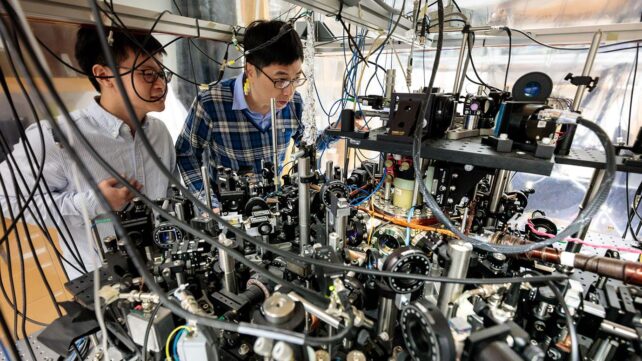Weird things happen on the quantum level. Whole clouds of particles can become entangled, their individuality lost as they act as one.
Now scientists have observed, for the first time, ultracold atoms cooled to a quantum state chemically reacting as a collective, rather than haphazardly forming new molecules after bumping into each other by chance.
"What we saw lined up with the theoretical predictions," says Cheng Chin, a physicist at the University of Chicago and senior author of the study. "This has been a scientific goal for 20 years, so it's a very exciting era."
All particles, atoms, and molecules buzz with heat energy, vibrating within the confines of their atomic structure or jostling alongside other molecules in a substance. Cooling particles down to ultracold temperatures coaxes them into a less chaotic state; pinning them in an optical trap also confines their motion.
Decades ago, scientists showed that as temperatures dropped to near absolute zero, particles even began to mesh together into conglomerates with a shared quantum identity; their individual properties washed out by strange collective behaviors that began to dominate.
Molecules are much harder to tame than atoms, though. But come 2019 scientists had found a way to wrangle them into shared quantum states too.
From there, scientists predicted that if molecules cohere or stick together when lured into the same quantum state, there could be a whole new kind of chemistry inside the quantum landscape.
In some cases, this shared quantum state, known as quantum degeneracy, was seen to suppress chemical reactions at a rate far greater than cold temperatures usually slow chemical reactions.
Researchers also thought molecules sharing a quantum state might produce accelerated chemical reactions if those molecules were 'coupled' together and reacting as one. However, as with any experiments probing the quantum realm, this theorized behavior has been difficult to observe.
"The observation of these many-body phenomena, also known as 'superchemistry', has been elusive so far," Chin and colleagues write in their published paper.
In their attempt, Chin and colleagues held an ultracold gas of cesium atoms in an optical trap, binding them in a shared quantum state. Then the researchers induced a chemical reaction to convert them into molecules by switching on a magnetic field, and analyzed the reaction dynamics.

Their results suggest chemical reactions indeed follow different rules in a degenerate quantum gas versus a normal gas.
Below a critical temperature, the team observed a steep drop in particle collisions. Meanwhile, they measured a rapid formation of molecules as atoms vanished in the chemical reaction – the particles had entered a quantum degenerate regime, and reactions were happening faster than they would under ordinary conditions.
"The sharp transition of the molecule formation rate around critical temperature Tc indicates different laws in the classical and quantum degenerate regimes," Chin and colleagues write.
After the magnetic field was switched off, the remaining atoms and molecules also hung about in a coherent coupling oscillating for several milliseconds. Further experiments revealed the underlying reaction mechanism, which the researchers describe as evidence of a 'quantum-enhanced' chemical process.
The experiments were, however, involved the creation of simple, two-atom molecules, so the team's findings will need repeating before we can be sure of what we're seeing. Experiments with larger, more complex molecules are also on the cards.
"The observation of coherent and collective chemical reactions in the quantum degenerate regime paves the way to explore the interplay between many-body physics and ultracold chemistry," the researchers conclude.
The study has been published in Nature Physics.
